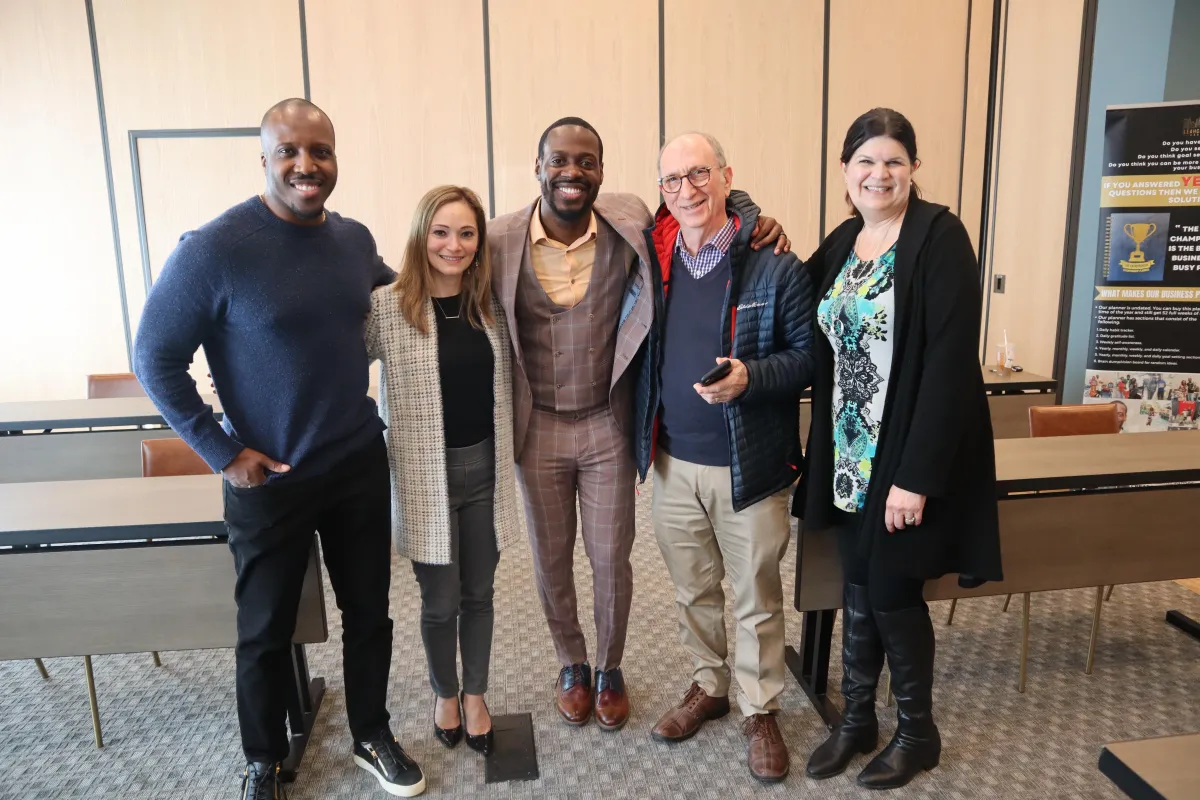WE SPECIALIZE IN A 3 PILLAR-PROVEN FRAMEWORK THAT HELPS SERVICE BASED BUSINESSES DOUBLE THEIR LEADS AND SALES WITHOUT SPENDING MORE MONEY ON MARKETING OR ADVERTISING
JUST FOCUS ON THESE 3 AREAS AND YOUR LEADS AND SALES WILL DOUBLE!
THIS VIDEO WILL EXPLAIN HOW YOU CAN DO THIS!
WE SPECIALIZE IN A 3 PILLAR-PROVEN FRAMEWORK THAT HELPS SERVICE BASED BUSINESSES DOUBLE THEIR LEADS AND SALES WITHOUT SPENDING MORE MONEY ON MARKETING OR ADVERTISING
JUST FOCUS ON THESE 3 AREAS AND YOUR LEADS AND SALES WILL DOUBLE! THIS VIDEO WILL EXPLAIN HOW YOU CAN DO THIS!
INTERESTED IN LEARNING MORE ABOUT OUR SERVICE?
INTERESTED IN LEARNING MORE ABOUT OUR SERVICE?
Meet
Coach Leahcim James

Hello, My name is Leahcim James and I was born in Kingston Jamaica, and raised in Queens NY. I started my first company at the age of 22, grew that company to over 3.5 million by the age of 29, and then retired from that industry the same year because I stopped enjoying who I was serving. Throughout my journey of building a multi-million dollar business in my early 20s, I gained a lot of insight, lessons, and clarity on who I can help achieve their best results.
My goal is straightforward… to help serious business owners implement the best growth strategies to generate more leads, close more sales, and increase their overall revenue and profits without feeling overwhelmed in the process. I specialize in sales and business growth strategies for small business owners. Over the years of running my own sales company, I’ve developed a deep understanding of the complex issues facing small business owners in the type of volatile economy we have today.
My experience has helped me develop skills to educate business owners quickly and effectively to successfully apply the right growth strategies in the correct order, allowing them to grow their businesses to their full capacity. My business growth strategies are perfectly designed to help business owners achieve their dream of building a thriving business that supports the lifestyle that they truly desire.
Meet
Coach Leahcim James

Hello, My name is Leahcim James and I was born in Kingston Jamaica, and raised in Queens NY. I started my first company at the age of 22, grew that company to over 3.5 million by the age of 29, and then retired from that industry the same year because I stopped enjoying who I was serving. Throughout my journey of building a multi-million dollar business in my early 20s, I gained a lot of insight, lessons, and clarity on who I can help achieve their best results.
My goal is straightforward… to help serious business owners implement the best growth strategies to generate more leads, close more sales, and increase their overall revenue and profits without feeling overwhelmed in the process. I specialize in sales and business growth strategies for small business owners. Over the years of running my own sales company, I’ve developed a deep understanding of the complex issues facing small business owners in the type of volatile economy we have today.
My experience has helped me develop skills to educate business owners quickly and effectively to successfully apply the right growth strategies in the correct order, allowing them to grow their businesses to their full capacity. My business growth strategies are perfectly designed to help business owners achieve their dream of building a thriving business that supports the lifestyle that they truly desire.
Upcoming Workshops
EXPLORE OUR LIVE AND VIRTUAL WORKSHOPS
Live
Events
Check out all our Live Local Events
Virtual Events
Attend One Of Our Virtual Events From Anywhere!
Upcoming Workshops
EXPLORE OUR LIVE AND
VIRTUAL WORKSHOPS
Live Events
Check out all our Live Local Events
Virtual Events
Attend One Of Our Virtual Events From Anywhere!
SERVICES




FLASH
COACHING
Flash Coaching offers affordable, unlimited 15-minute coaching sessions tailored for start-ups and existing businesses. This program focuses on one specific issue at a time, providing actionable, personalized advice for quick wins that drive long-term success. Perfect for business owners looking for cost-effective guidance to grow their business without a big investment.
GROUP
COACHING
My group coaching program will allow you to not only learn new business growth strategies from me, but also other small business owners with the same goals as you have for your own business. We will work on application of these strategies because knowledge is pointless without using it.
ONE-ON-ONE
COACHING
Isn’t it time you had a clear path to success?
Stop struggling alone—business is a team sport. With our team of experts, you’ll receive one-on-one coaching, a clear roadmap to double your leads and sales, and proven strategies to build a 7-figure foundation—without spending more money on marketing or advertising.
Coaching isn’t just advice; it’s hands-on support to help you implement these strategies effectively.
VIRTUAL BUSINESS ACADEMY
Access the Tools, Training, and Resources to Double Your Business Profits Anytime, Anywhere
Unlock 24/7 access to the Online Business Academy, a proven system designed to generate more leads, attract more clients, and boost your revenue. With a $1M Marketing Library, a 52-Week Virtual MBA, and expert business financial training, you'll have everything you need to build a thriving, profitable business on your terms.
SERVICES

FLASH
COACHING
Flash Coaching offers affordable, unlimited 15-minute coaching sessions tailored for start-ups and existing businesses. This program focuses on one specific issue at a time, providing actionable, personalized advice for quick wins that drive long-term success. Perfect for business owners looking for cost-effective guidance to grow their business without a big investment.

GROUP
COACHING
My group coaching program will allow you to not only learn new business growth strategies from me, but also other small business owners with the same goals as you have for your own business. We will work on application of these strategies because knowledge is pointless without using it.

ONE-ON-ONE
COACHING
Isn’t it time you had a clear path to success?
Stop struggling alone—business is a team sport. With our team of experts, you’ll receive one-on-one coaching, a clear roadmap to double your leads and sales, and proven strategies to build a 7-figure foundation—without spending more money on marketing or advertising.
Coaching isn’t just advice; it’s hands-on support to help you implement these strategies effectively.

VIRTUAL BUSINESS ACADEMY
Access the Tools, Training, and Resources to Double Your Business Profits Anytime, Anywhere
Unlock 24/7 access to the Online Business Academy, a proven system designed to generate more leads, attract more clients, and boost your revenue. With a $1M Marketing Library, a 52-Week Virtual MBA, and expertbusiness financial training, you'll have everything you need to build a thriving, profitable business on your terms
Which Business Season Are You In?
Claim Your Complimentary Ebook from Leahcim James to Take Your Business to the Next Level!
Choose the e-book that best matches your current stage of business growth:
○The Championship 12: For business owners seeking proven strategies to double their leads and sales.
○Winning the Profit Game: For business owners with consistent revenue who are looking for practical ways to maximize profits and efficiency.
○Peak Performance: For business owners with a team, ready to operate at the highest level by implementing creative marketing strategies.
Click below to discover which free e-book best fits your current business season and start thriving today!

Which Business Season Are You In?
Claim Your Complimentary Ebook from Leahcim James to Take Your Business to the Next Level!

Click below to discover which free e-book best fits your current business season and start thriving today!
TESTIMONIALS
TESTIMONIALS
PRIVACY POLICY
TERMS & CONDITIONS
***DISCLAIMER:
The information contained on this Website and the resources available for download through this website is not intended as, and shall not be understood or construed as, professional advice. While the employees and/or owners of the Company are professionals and the information provided on this Website relates to issues within the Company’s area of professionalism, the information contained on this Website is not a substitute for advice from a professional who is aware of the facts and circumstances of your individual situation. Nothing on this site, nor advice from our experts, shall constitute legal advice.
Copyright 2025© Leahcim James Coaching | King Of Prussia, PA, US

ALL RIGHTS RESERVED